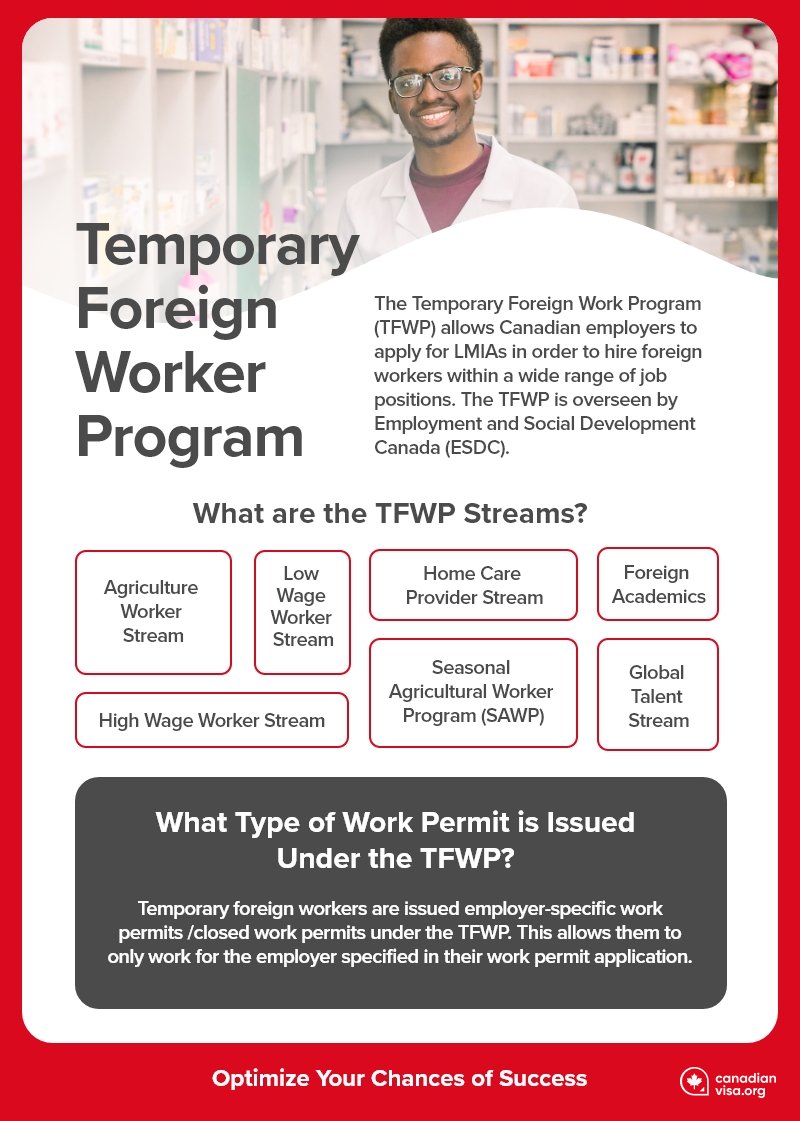Canada has skills, and labour shortages in many industries across the country due to an aging population. The current worker-to-retiree ratio is 4 to 1. The solution? Temporary foreign workers help Canadian employers to meet labour needs when qualified Canadians or permanent residents aren’t available. Even more importantly, temporary workers support the success and growth of many industries, such as agriculture, healthcare, and technology. This is exactly why the Temporary Foreign Worker Program was formed.
What is the Temporary Foreign Worker Program (TFWP)?

Planning to recruit from abroad? Want to work in Canada? The Temporary Foreign Worker Program (TFWP) is designed for
Canadian employers to hire foreign workers within a wide range of job positions. The most important part of the TFWP
hiring process is applying for a
Labour Market Impact Assessment (LMIA). An LMIA proves that no Canadian or permanent resident was available to fill the job position. The temporary worker you wish to hire must submit a copy of the LMIA or the LMIA
number along with their work permit application.
If you want to hire a foreign worker that is exempt from an LMIA you can do so through the International Mobility Program (IMP).
Changes to The FSTW in 2024
The Temporary Foreign Worker (TFW) Program experienced a surge in demand due to the post-pandemic economy, low unemployment rates, and record-high job vacancy rates in 2022. To address those labour shortages, the Program adopted a series of policy changes. With changing labour market conditions and declining job vacancies, the Government is adjusting the Temporary Foreign Worker Program to ensure the program continues to only be used in cases where there are no workers here in Canada that can fill the necessary role.
The Honourable Randy Boissonnault, Minister of Employment, Workforce Development and Official Languages, announced that some time-limited measures under the TFW Program Workforce Solutions Road Map will not be renewed and will end, earlier than planned, this spring.
- Effective May 1, 2024:
- New Labour Market Impact Assessments (LMIAs) will be valid for six months (a decrease from 12 months) to ensure accurate labour market needs.
- All employers identified in the 2022 Workforce Solutions Road Map will have a reduction from 30% to 20% of their total workforce that can come in through the Temporary Foreign Worker Program, under the low wage stream, with an exception for the construction and health care sectors.
- Employers will need to explore every option before applying for an LMIA — including recruiting asylum seekers with valid work permits here in Canada.
In addition, as of January 1, 2024, employers are required to annually review the wages of temporary foreign workers to ensure they reflect increases to prevailing wage rates for their given occupation and region of work. Through wage increases, these reviews will ensure that employers continue to pay temporary foreign workers at the prevailing wage level throughout their period of employment. For the vast majority of cases, when wages are reviewed, they are increased for the workers. If not, they remain the same and cannot go down upon review.
The Government of Canada will continue to monitor labour market conditions to ensure that the TFW Program reflects current economic needs, and that Canadians are considered first for job opportunities, while also ensuring that the rights of temporary foreign workers in Canada are protected.
Temporary Foreign Worker Program Streams

The Temporary Foreign Work Program is divided into sub-categories or streams. Canadian employers who
wish to hire temporary foreign workers must apply through a TFWP stream that supports their hiring needs. Each
stream has a list of requirements that must be met to compile a winning LMIA application for Employment and Social
Development Canada (ESDC).
The TWFP streams vary based on the wages offered to workers (above or below the Canadian average) and the worker’s skills level according to the National Occupation Classification (NOC) system (high-skilled or low-skilled workers). Learn more about the seven different TFWP streams below.
1. High Wage Worker Stream
Employers who plan to hire a temporary foreign worker who will be paid at or above the median hourly wage of their province or territory must apply for an LMIA through the TFWP stream for high-wage workers, demonstrating that they were unable to find a Canadian citizen or permanent resident to fill the position.
Once an employer is issued a positive LMIA for a high-wage skilled position, they must send a copy of the LMIA to the worker which enables them to apply for a Canadian work permit through a work permit application or a permanent residency application, depending on eligibility. LMIA documents are valid for six months only, so ideally, foreign workers must apply for their work permits as soon as possible.
2. Low Wage Worker Stream
Employers who plan to hire a temporary foreign worker who will be paid less than the median hourly wage of their province or territory must apply for an LMIA through the TFWP stream for low-wage workers, demonstrating that they were unable to find a Canadian citizen or permanent resident to fill the position.
Hiring low-wage workers requires employers to meet additional requirements to ensure the workplace rights and safety of low-wage non-resident workers. Once an employer is issued a positive LMIA for a low-wage skilled position, they must send a copy of the LMIA to the worker which enables them to apply for a Canadian work permit through a work permit application or a permanent residency application, depending on eligibility. The LMIA is valid for six months after being issued.
3. Agriculture Worker Stream
Due to Canada’s ongoing demand for agricultural workers, especially in peak seasons, employers who need to hire workers to fill specific job positions related to agricultural production may be able to use one of two agricultural streams to accelerate the hiring process. In order to qualify for either stream, employers must ensure that their production is in a sector on Canada’s national commodity list and the activity must be related to on-farm primary agriculture in one of these National Occupational Classification codes: 0821, 0822, 8252, 8255, 8431, 8432, and 8611.
4. Seasonal Agricultural Worker Program (SAWP)
Canada has bilateral agreements with specific countries that allow employers to hire agricultural workers to work in Canada for up to eight months during peak farming periods. The foreign workers must be citizens of Mexico or one of the following Caribbean countries; Anguilla, Antigua and Barbuda, Barbados, Dominica, Grenada, Jamaica, Montserrat, St. Kitts-Nevis, St. Lucia, St. Vincent and the Grenadines, and Trinidad and Tobago. If an employer meets the requirements for the SAWP, they can apply for an LMIA and easily hire qualified workers with experience and who can meet the additional requirements of working in Canada.
5. Global Talent Stream (GTS)
The Global Talent Stream (GTS) assists eligible Canadian employers to hire highly-skilled workers under one of two categories. Category A = is for employers who have been referred to by one of the GTS designated partners and want to hire highly-specialized workers. Category B is for employers who want to hire highly-skilled workers on the GTS Occupations List. The Global Talent Stream expedites the hiring process for employers by doing away with the LMIA requirement to prove they first tried recruiting Canadians and permanent residents of Canada. Also, work permit applications for the GTS are processed in about 10 business days.
6. Home Care Provider Stream
Families who need to hire a foreign caregiver to provide care, in a private residence, to seniors or individuals with medical needs, or children, may be able to do so through the Home Care Provider Stream of the TFWP. This stream enables families to hire temporary foreign workers, provided that the positions to be filled meet one of the following criteria:
Caregivers for children: Nannies, au-pairs and babysitters are just some of the positions that fall under this category, and provide care to children under the age of 18 years old. The position must meet the requirements for National Occupation Classification (NOC) Code 44100 for home child-care providers.
Caregivers for persons with high medical needs: Family caregivers, housekeepers, and personal aides are just some of the positions that fall under this category, and provide care to seniors or to persons with disabilities. The position must meet the requirements for one of NOC 44101, home support workers, caregivers and related occupations. Families must follow the same application procedure as employers hiring through the high-wage and low-wage streams. Additionally, families must provide evidence that they have a dependent family member who requires in-home care; and show proof that they have the financial means to pay the wages of the in-home caregiver.
Note: Families hiring in-home caregivers for seniors and people living with disabilities are exempt from the LMIA application fee. Also, families hiring in-home caregivers for children will be exempt from the LMIA application fee if their gross annual income is less than CAD150,000.
7. Foreign Academics
It is in the best interest of universities, degree-granting colleges, and unions representing Canadian education to hire foreign academics. They fill in-demand positions and bring new knowledge and expertise to Canadian campuses. Employers must follow the same application procedure as employers hiring through the high-wage stream. In most cases, foreign nationals hired in research positions at post-secondary institutions may be exempt from requiring an LMIA, a work permit, or both.
Benefits of Working in Canada as a Temporary Worker

Working in Canada as a temporary foreign worker offers a myriad of benefits that extend beyond just earning a paycheck. One of the most significant advantages is the opportunity to gain invaluable Canadian work experience. This experience not only enhances your resume but also increases your prospects of obtaining permanent residency in the country.
Canadian immigration programs, such as Provincial Nomination Programs (PNPs), often prioritize applicants with local work experience over those with experience gained abroad. By working in Canada temporarily, you can fulfill this requirement and position yourself favorably for immigration pathways. For instance, PNPs typically mandate applicants to have 6-12 months of work experience within the province they are applying to. By accumulating this experience while working as a temporary foreign worker, you align yourself with the criteria set forth by these programs, thereby enhancing your chances of obtaining permanent residency.
Moreover, working in Canada allows you to immerse yourself in the Canadian workplace culture, norms, and practices. This firsthand exposure provides valuable insights into the local labor market dynamics, which can be advantageous when seeking future employment opportunities or advancing in your career. Additionally, working alongside Canadian colleagues enables you to network within your industry and establish professional connections that may prove beneficial in the long run.
Furthermore, Canada offers a high standard of living with access to excellent healthcare, education, and social services. As a temporary worker, you and your family members may be eligible for certain benefits, such as healthcare coverage, depending on the specific work permit you hold and the province you reside in. These benefits contribute to your overall well-being and provide peace of mind during your stay in Canada.
Working as a temporary foreign worker in Canada not only provides immediate employment opportunities but also lays the foundation for long-term career growth and immigration prospects. The experience gained, coupled with access to essential services and the welcoming environment of Canada, makes it an attractive destination for individuals seeking employment opportunities abroad.
FAQs

What Type of Canadian Work Permit is Issued Under the TFWP?
Employer-specific work permits or closed work permits are issued to temporary workers under the TFWP. They allow you to work in Canada according to the specific conditions on your work permit, which include:
- the name of the employer you can work for;
- how long you can work; and
- the location where you can work
What are the Requirements to Apply for a Canadian Work Permit under the TFWP?
You need to submit a work permit application with all the required documents to the IRCC. You may have to include the following documents:
- Valid job offer letter;
- Proof that you meet the requirements of the job offer;
- Copy of a positive LMIA or LMIA number;
- Proof of your English or French language abilities via test results;
- Medical examination (if needed);
- Valid passport;
- Police clearance certificate (if asked); and
- Show proof of funds to take care of yourself and any accompanying family members during your stay, and to return home
How Long Does it Take to Process Work Permit Applications Under the TFWP?
Typically, processing times for Canadian work permit applications under the TFWP can run for many months with a few exceptions. Temporary workers with LMIAs through the Global Talent Stream and their family members may be eligible for two-week processing.



